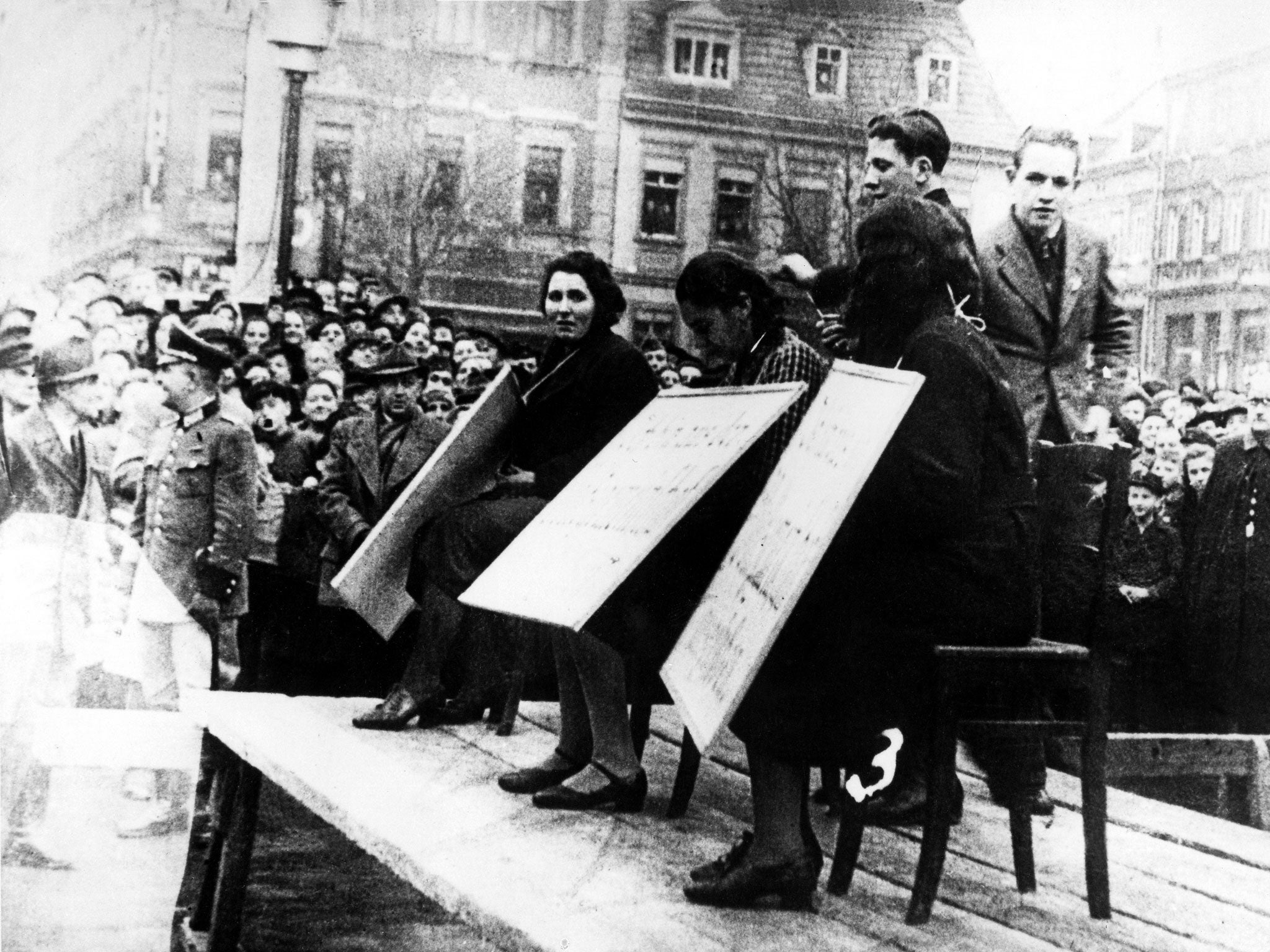Pogrom November 1938: Testimonies from Kristallnacht, Edited by Ruth Levitt, book review: Night hope was shattered
There are horrific 'treasures' in this collection that gives a voice to Jews who suffered Nazi persecution

Sometimes it's easy to put historical events into a neat box, to see time as a succession of comprehensible, self-contained episodes. In the case of the Nazi pogrom against the Jews of Germany on 9-10 November 1938 – also known as Kristallnacht for the amount of glass smashed, although this term certainly minimises the destruction – it would seem that its meaning and its place in history is clear: over those terrible nights in Germany, the Nazis used the assassination of a member of the German legation in Paris by a German-born Jew, to unleash a savage wave of violence against the country's beleaguered Jewish population. Thousands of synagogues and Jewish-owned businesses were sacked, hundreds of Jews were killed and tens of thousands taken into custody.
The pogrom attracted global outrage and led those Jews who could get a visa to flee Germany. Although its death toll was to be dwarfed by the later horrors of the Holocaust, the 9-10 November pogrom was the point when the Nazi regime began to take the final steps towards genocide. Such a summary, while accurate, fails to capture the true enormity of what happened in 1938. While sometimes it is the job of historians to create a comprehensible narrative from the messiness of reality, at other times the opposite strategy is appropriate. And this is the value of the massive collection Pogrom November 1938.
The book emerged out of the archives of London's Wiener Library. Founded by Alfred Wiener, a German Jew who fled the Nazi regime in 1933, initially to Amsterdam and then in 1939 to London, it is today one of the world's most extensive collections of material on the Holocaust and the Nazi era. Pogrom November 1938 reproduces 350 "testimonies" collected by Wiener's Jewish Central Information Office (JCIO) in the days, weeks and months following the pogrom. Never before translated into English, they form the centrepiece of the book and a digital resource due to be launched on 11 November.
The testimonies draw on a range of informants, some anonymous, others named with a few details about who they were. Literary styles vary greatly: some are dispassionate intelligence-style reports, listing buildings destroyed and people killed and taken into custody. Others are personal testimonies of the horrors endured at the time, sometimes eloquent, sometimes inarticulately angry, sometimes emotionally draining. The book plays it straight, reprinting the testimonies in the order in which they were originally numbered, with a minimum of annotation and contextual information. For that reason, Pogrom November 1938 is not an easy read, as there is no thematic structure: extensive reports are interspersed with terse ones on completely different themes. One has to persevere, but there are horrific "treasures" buried in this collection that deserve to be highlighted.
Hidden away in report 135, is a collation of transcripts of letters from Jewish children fleeing Germany for England in the wake of the pogrom. Their forced cheerfulness in writing to parents and family that they'd often never see again is heart-rending. They excitedly talk about the food they are given on the transit through the Netherlands ("Oh it is wonderful!" one writes), but the mask sometimes slips – one child writes to his mother "Are you still crying?"
Who knows what those children had previously endured? Another report on refugee children tells of an eight-year-old whose house was "devastated" and whose parents were imprisoned: "The child looked for his money box among the rubble, smashed it open and came to Amsterdam alone."
The desperate plight of those left behind comes through in pleas for visas and overseas jobs, despite the superficial Germanic restraint; one pleads to a friend in a letter transcribed in one report "Don't you have any friends at all in Switzerland, or in Holland or England who could take me as a domestic servant?" There is less restraint in a report from a self-defined "Aryan Christian" woman, who ends an extended plea to "get those unfortunates out" with the cry "HELP!"
While the structurelessness of the book can be frustrating, it also lends it a terrible immediacy, reflecting the desperate need of German Jews like Wiener to make some sense of what was happening in a country with no free media. The sheer size of the pogrom and the number of people who suffered, is brought alive in a book that refuses to boil down history into an easily digestible narrative. One would not wish all history books to be like this, but we should be glad that this one exists.
Keith Kahn-Harris is the author of 'Uncivil War: The Israel Conflict in the Jewish Community'
Souvenir, £30. Order at £27 inc. p&p from the Independent Bookshop
Join our commenting forum
Join thought-provoking conversations, follow other Independent readers and see their replies
Comments